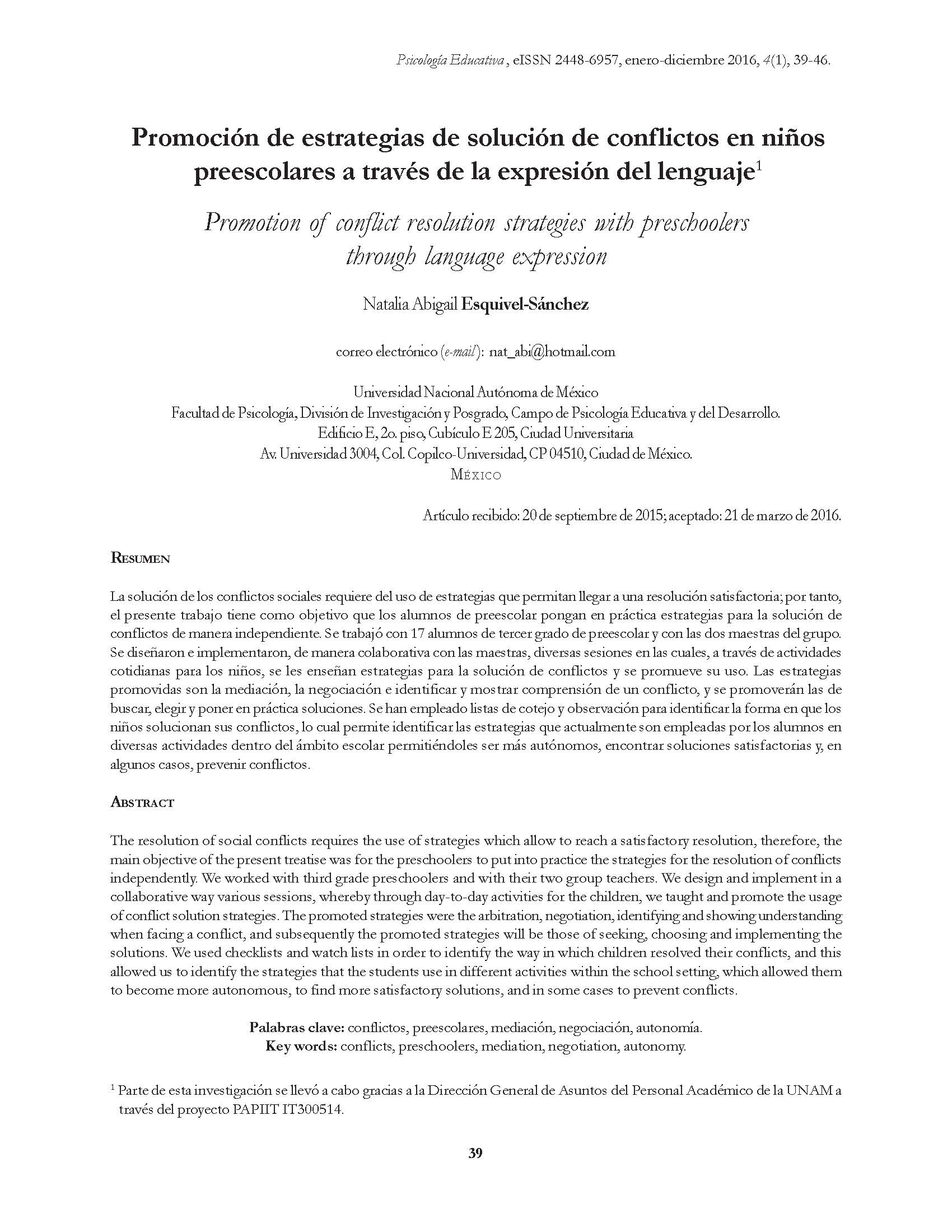Abstract
The resolution of social conflicts requires the use of strategies which allow to reach a satisfactory resolution, therefore, the main objective of the present treatise was for the preschoolers to put into practice the strategies for the resolution of conflicts independently. We worked with third grade preschoolers and with their two group teachers. We design and implement in a collaborative way various sessions, whereby through day-to-day activities for the children, we taught and promote the usage of conflict solution strategies. The promoted strategies were the arbitration, negotiation, identifying and showing understanding when facing a conflict, and subsequently the promoted strategies will be those of seeking, choosing and implementing the solutions. We used checklists and watch lists in order to identify the way in which children resolved their conflicts, and this allowed us to identify the strategies that the students use in different activities within the school setting, which allowed them to become more autonomous, to find more satisfactory solutions, and in some cases to prevent conflicts.
References
Abd, N., Sujud, R., Subramaniam, V., Rafidah, N. y Azma, Z. (2008). Helping children resolve conflict in communication. The International Journal of Learning. 15, 11.
Barkley, E., Cross, P. y Howell, C. (2005). Técnicas de aprendizaje colaborativo. España: editorial Morata.
Bandura, A. y Walters, R. (1977). Aprendizaje y desarrollo de la personalidad. España: Alianza Editorial.
Bernaza, G. y Lee, F. (2005). El aprendizaje colaborativo: una vía para la educación de postgrado. Revista Iberoamericana de Educación.
Bronson, M. (2000). Self-regulation in early childhood: nature and nurture. USA: Guilford
Caycedo, C., Gutiérrez, C., Ascencio, V. y Delgado, A. (2005). Regulación emocional y entrenamiento en resolución de problemas sociales como herramienta de prevención en niños de 5 a 6 años. Suma Psicológica. 12. 2, 157-173.
Funes, S. (2000). Resolución de conflictos en la escuela: una herramienta para la cultura de paz y la convivencia. Contextos Educativos 3, pp. 91-106.
Fuquen, M. (2003). Los conflictos y las formas alternativas de resolución. Tabula Rasa 001, 265-278.
Gilies, R. (2007). Cooperative learning. Integrating theory and practice. USA: Sage publications
Girard, K. y Koch, S. (1997). Resolución de conflictos en las escuelas. Manual para las escuelas. Argentina: Granica. Guiborg, I. (2005). El desarrollo de la comunicación. En Barragán, C.; Camps, A.; Claustre, M.; Ferrer,
J., y otros. Hablar en clase. Cómo trabajar la lengua oral en el centro escolar. Venezuela: Laboratorio educativo Jiménez, K. (2009). Propuesta estratégica y metodológica para la gestión en el trabajo colaborativo. Revista
Educación 33. 2, 95-107.
Lozada, R. (2002). Promoción de la narrativa oral en niños preescolares. Reporte y manual de aplicación. Tesis de Maestría, Universidad Nacional Autónoma de México. Recuperado de: http://132.248.9.195/ pdtestdf/0312842/Index.html
Miles, E. y Trott, W. (2011). Collaborative Working. Inside out. A series of personal perspectives on government effectiveness. Institute for Government.
Murillo, P., Gandul. I. y Pérez Llorente, T. (1996). Apoyo colaborativo interprofesional. En: Parrilla, A. (1996). Apoyo a la escuela: un proceso de colaboración. España: Ediciones Mensajero.
Monjas, M. (1997). Programa de enseñanza de habilidades de interacción social (PEHIS) para niños y niñas de edad preescolar. (3a edición.) Madrid: Ciencias de la Educación Preescolar y Especial.
Panitz, T. (1996). A definition of collaborative vs cooperative learning.
Romero, G. (2005). Evaluación y entrenamiento de habilidades de solución de problemas en niños que presentan conducta agresiva. Tesis inédita de Maestría. UNAM.
Sellman E. (2011). Peer mediation services for conflict resolution in schools: what transformations in activity characterize successful implementation? British Educational Research Association 37(1): 45-60. doi: 10.1080/01411920903419992.
Zañartu, M. (2003). Aprendizaje colaborativo: una nueva forma de diálogo interpersonal y en la red. Revista digital de educación y nuevas tecnologías 5(28)

This work is licensed under a Creative Commons Attribution-NonCommercial-NoDerivatives 4.0 International License.
Copyright (c) 2024 Universidad Nacional Autónoma de México


